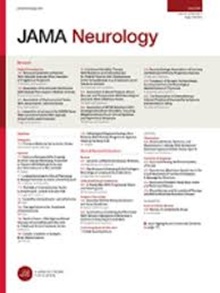Discontinuation of First-Line Disease-Modifying Therapy in Patients With Stable Multiple Sclerosis
IF 20.4
1区 医学
Q1 CLINICAL NEUROLOGY
引用次数: 0
Abstract
ImportanceIncreasing numbers of people with multiple sclerosis (MS) use disease-modifying therapy (DMT). Long-term stable disease while taking such medications provides a rationale for considering DMT discontinuation given patient burden, costs, and potential adverse effects of immunomodulating therapy.ObjectiveTo investigate whether first-line DMT can be safely discontinued in patients with long-term stable MS.Design, Setting, and ParticipantsThis multicenter, rater-blinded, noninferiority randomized clinical trial was conducted between July 1, 2020, and March 20, 2023, at 14 Dutch centers. Data analysis was performed between July 2023 and January 2024. Key inclusion criteria were relapse-onset MS, aged 18 years or older, without relapses, and without substantial magnetic resonance imaging (MRI) activity in the previous 5 years under first-line DMT. Participants were randomized 1:1 to discontinue or continue first-line DMT.InterventionDiscontinuation of first-line DMT.Main Outcome and MeasureThe primary outcome was significant inflammatory disease activity, defined as relapse and/or 3 or more new T2 lesions or 2 or more contrast-enhancing lesions on brain MRI.ResultsOf 163 potentially eligible participants, 89 participants were included in the trial at the moment of early termination. Forty-four participants (49.4%) were assigned to the continue group and 45 participants (50.6%) were assigned to the discontinue group. Median (IQR) age was 54.0 (49.0-59.0) years, and 60 participants (67.4%) were female. Two participants in the continue group were lost to follow-up. After a median (IQR) follow-up time of 15.3 (11.4-23.9) months, the trial was prematurely terminated because of inflammatory disease activity recurrence above the predefined limit. In total, 8 of 45 participants in the discontinue group (17.8%) vs 0 of 44 participants in the continue group reached the primary end point and had recurrent, mostly radiological inflammation. Two of these 8 participants had a clinical relapse. Median (IQR) time to disease activity was 12.0 (6.0-12.0) months.Conclusions and RelevanceIn this randomized clinical trial, even in patients with long-term MS stable for over 5 years, first-line DMT discontinuation can lead to recurrence of inflammatory disease activity. Although this study cohort was relatively small, the recurrence of inflammation in the discontinue group was significantly higher than in the continue group and also higher than in the previously published DISCOMS trial, which only included individuals aged 55 years or older. This study provides additional data, especially in a younger population and including longitudinal biomarker measurements, for informed decision-making in cases when treatment discontinuation is considered.Trial RegistrationClinicalTrials.gov Identifier:稳定性多发性硬化症患者停止一线疾病改善治疗
越来越多的多发性硬化症(MS)患者使用疾病改善疗法(DMT)。考虑到患者负担、费用和免疫调节治疗的潜在不良影响,服用此类药物时疾病长期稳定提供了考虑停用DMT的理由。目的探讨长期稳定多发性硬化症患者是否可以安全停用一线DMT设计、环境和参与者这项多中心、非盲法、非劣效性随机临床试验于2020年7月1日至2023年3月20日在荷兰的14个中心进行。数据分析时间为2023年7月至2024年1月。主要入选标准是复发性MS,年龄在18岁或以上,没有复发,并且在一线DMT治疗的前5年内没有明显的磁共振成像(MRI)活动。参与者按1:1的比例随机分为停止或继续一线DMT。干预:停止一线DMT治疗。主要结果和测量主要结果为显著的炎症性疾病活动,定义为复发和/或3个或更多新的T2病变或2个或更多脑MRI增强病变。结果在163名可能符合条件的参与者中,89名参与者在早期终止时被纳入试验。44名参与者(49.4%)被分配到继续组,45名参与者(50.6%)被分配到停止组。中位(IQR)年龄为54.0(49.0-59.0)岁,60名参与者(67.4%)为女性。继续组的两名参与者没有随访。在中位(IQR)随访时间为15.3(11.4-23.9)个月后,由于炎症性疾病活动复发超过预定限制,试验过早终止。停药组45名参与者中有8名(17.8%)达到主要终点,而继续组44名参与者中有0名出现复发性炎症,主要是放射性炎症。这8名参与者中有2人出现了临床复发。到疾病活动的中位(IQR)时间为12.0(6.0-12.0)个月。结论和相关性在这项随机临床试验中,即使在长期MS稳定超过5年的患者中,一线停用DMT也可能导致炎症性疾病活动的复发。虽然这项研究的队列相对较小,但停药组的炎症复发率明显高于继续组,也高于先前发表的DISCOMS试验,该试验仅包括55岁或以上的个体。这项研究提供了额外的数据,特别是在年轻人群中,包括纵向生物标志物测量,为在考虑停止治疗的情况下做出明智的决策提供了依据。试验注册:clinicaltrials .gov标识符:NCT04260711
本文章由计算机程序翻译,如有差异,请以英文原文为准。
求助全文
约1分钟内获得全文
求助全文
来源期刊

JAMA neurology
CLINICAL NEUROLOGY-
CiteScore
41.90
自引率
1.70%
发文量
250
期刊介绍:
JAMA Neurology is an international peer-reviewed journal for physicians caring for people with neurologic disorders and those interested in the structure and function of the normal and diseased nervous system. The Archives of Neurology & Psychiatry began publication in 1919 and, in 1959, became 2 separate journals: Archives of Neurology and Archives of General Psychiatry. In 2013, their names changed to JAMA Neurology and JAMA Psychiatry, respectively. JAMA Neurology is a member of the JAMA Network, a consortium of peer-reviewed, general medical and specialty publications.
 求助内容:
求助内容: 应助结果提醒方式:
应助结果提醒方式:


